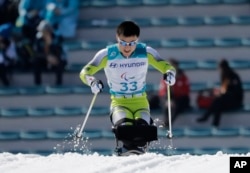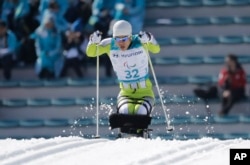The first North Korean winter Paralympic team returned home Thursday after participating in the Pyeongchang Games in South Korea. The inclusion of disabled athletes from the North is a sign of progress for a country accused of widespread human rights violations that include claims of discrimination and abuse of physically handicapped people.
“I hope that such measures will help to improve the human rights of disabled people and that the improvement of disability rights will ultimately help improve the human rights situation in North Korea as a whole,” said Oh Joon, a former South Korean ambassador to the United Nations, who was named an honorary ambassador for the Pyeongchang Winter Olympic and Paralympic Games.
While Pyeongchang was the North’s first winter Paralympics, it did send athletes to the 2012 summer Paralympics in London and the 2016 games in Rio de Janeiro.
The North’s Pyeongchang Paralympic participation, which included a 24-member delegation and two competing athletes, is also part of the continuing inter-Korean Olympic outreach that has opened the door to an expected U.S.-North Korea summit to find a peaceful resolution to end Pyongyang’s threatening nuclear program.
Skiing for four months
The North Korean Paralympians, Kim Jong Hyon and Ma Yu Chol, both suffered leg amputations as children after being involved in car accidents. In Pyeongchang, they finished in last and next to last place in the cross-country sit-skiing event.
Kim and Ma only learned to ski in December and began training for the Paralympics before knowing whether North Korea would agree to participate. They received assistance, equipment and training from Sue Kinsler, who runs the Kinsler Foundation, a U.S.-based charity. She has worked with disabled athletes and artists in North Korea for more than 20 years.
“We prepared in order to participate, if we get the chance. Even if we were not able to participate due to political reasons, it was preparing for the next winter Olympics,” said Kinsler, whose Korean name is Shin Young-soon.
Even though they did not win a medal, these disabled athletes have said that training and participating in sports has helped them develop confidence and a sense of purpose.
Past abuse
North Korea’s Paralympic engagement stands in contrast to past claims of abuse of the disabled.
A 2006 U.N. report on human rights in North Korea described the situation for people with disabilities as “very disconcerting” and expressed concern that the disabled are being forced to move outside of the capital Pyongyang, and that people with mental disabilities are being sent to camps “with harsh and subhuman conditions.”
There have also been claims by some defectors that authorities in North Korea have ordered that infants with disabilities be killed.
“I do not know how much of these things are true, but it seems that the human rights of disabled people were certainly not guaranteed,” said Ambassador Oh, who was chairman of the Convention on the Rights of Persons with Disabilities during his time at the U.N.
In the last few years, the Kim Jong Un government has increased cooperation with the international community to improve conditions for the disabled. In 2016 North Korea ratified the U.N. Convention on the Rights of Persons With Disabilities.
And in 2017, Catalina Devandas Aguilar, the U.N. Special Rapporteur on the rights of people with disabilities, became the first U.N. human rights envoy allowed to visit North Korea. At the conclusion of her visit, she commended the North Korean government for adopting an amended law on the Protection of the People with Disabilities, and for its “commitment to advance the realization of the rights of disabled persons.”
However, she also noted that for people with physical disabilities in North Korea, educational services are limited, certain health care and social protection mechanisms are lacking, many buildings lack wheelchair ramps and elevators, and there is a strong stigma still associated with disabilities.
Defiant denial
While North Korea engaged with the international community to improve conditions for the disabled, it has taken a confrontational approach to defiantly deny charges of widespread atrocities.
A 2014 U.N. report documented a network of political prison camps in North Korea where more than 100,000 people, including children, have been detained, and where cases of execution, torture, rape and forced labor are prevalent. The U.N. General Assembly passed a resolution to refer the leadership in Pyongyang to the International Criminal Court for crimes against humanity, but the measure has since been stalled in the Security Council, where the North’s allies, China and Russia, are believed to be preventing any further action on the measure.
The Kim government has rebutted accusations of committing widespread rights abuses against its people, denied envoys access to verify these charges, and refused to attend recent U.N. human rights council meetings focused on the situation in North Korea.
Tomas Ojea Quintana, the U.N. Special Rapporteur on Human Rights in North Korea, said this week that any negotiations with Pyongyang on its nuclear program should include talks to address alleged human rights violations in the country as well.
Lee Yoon-jee in Seoul contributed to this report.













